By Eve Flanigan
The quest to shoot better, to be an effective bodyguard for one’s self and loved ones or even to just learn to handle a gun safely usually requires live interaction with an instructor. Though there is a lot of worthy content online, handling firearms has physical, kinetic and sometimes mathematical challenges that everyone, sooner or later, must overcome with in-person help. There are many private instructors and training companies across the nation to satisfy that need for help—but how do you select the one that best suits your needs?
Matching the Instructor to Your Needs
To start, define what it is you want from using a gun. A typical concern for new adult shooters, for instance, may go something like, “My spouse insists on having a gun in the bedroom in case of a home invasion. But I’m afraid to touch it and worried about my grandson accessing it when he visits. I need to learn how to be safe with this gun.” Clearly, that person needs to learn how to safely handle a firearm—how to pick it up correctly, how to keep their finger off the trigger, basics of sight picture and trigger control, etc.—as well as education on safe storage options.
At the other end of the spectrum, someone who’s handled one type of gun for years might want to understand how to handle and maintain an entirely different kind of firearm. That person would likely have safe firearms handling down pat, but need instruction on that new firearm’s action, idiosyncrasies, break-down and reassembly.

No matter where you are on the firearms-knowledge spectrum, define what it is that you wish to accomplish through instruction, then seek an instructor who advertises as having or, better yet, is known by trusted friends to have, skills in your area of interest.
They Have the Resume, But Are They a Good Fit?
Once you’ve arrived at that first lesson with the instructor you’ve chosen, how do you evaluate whether they’re a good fit for future instruction? Here are a few tips to make that decision clearer.
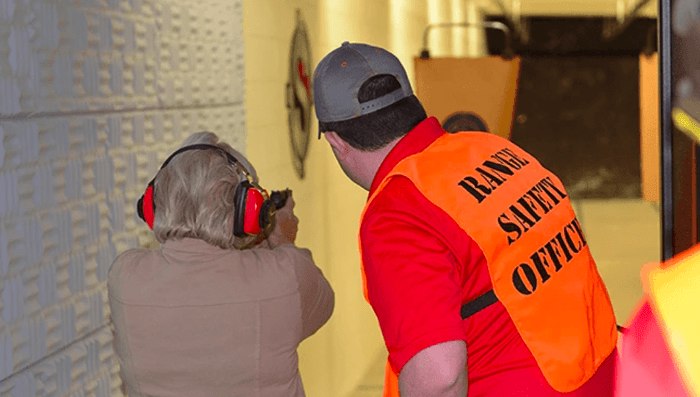
1. Good Instructors Put Safety First
Every reputable school or instructor begins the day’s session with a confirmation of the rules for safe gun handling and that all present understand and will abide by those rules. Competent instructors understand that no activity, including shooting, is without risk, but they also balance that risk with safety practices suited to the skill level of the group.
A good instructor, for instance, would take someone who signed up for a tactical skills class but who admitted to never having handled a firearm before, and allow them to audit the class without shooting…and then schedule them for a Skills 101 session.
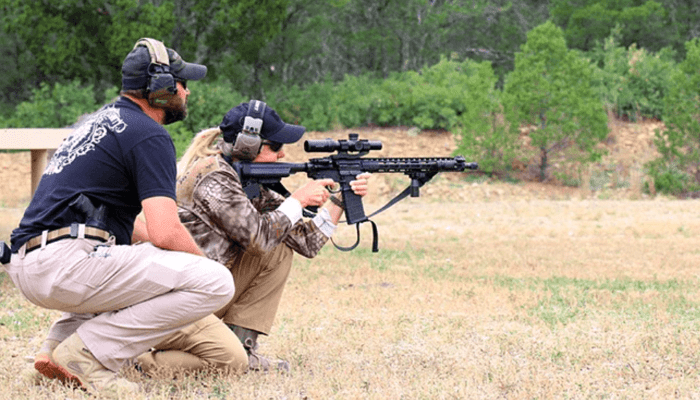
2. Good Instruction Addresses Your Goals
Once your research is completed and you’ve decided on an instructor, call the range and discuss with that instructor what your goals are and the gear required to successfully complete the class. Depending on class size, you may or may not have the opportunity to share personal goals during the class, so this bit of homework beforehand can help make sure you’re not wasting your time nor the instructor’s in a class that doesn’t work towards what you want to accomplish.
During class, a good instructor should take at least some time to answer specific questions. Such an instructor will also admit when a question exceeds their realm of expertise, and if they’re really good, they’ll have referral resources available.

3. Skilled Instructors Adapt to Students’ Learning Styles And Level Of Readiness
The wise instructor should have an assortment of communication styles and methods for helping students understand and develop their skillsets. This includes the ability to explain, with real-world reasoning, why any given skill is being taught. An expert’s technical expertise or career’s worth of experience is only useful if the information is delivered in a manner that can be absorbed, applied, and retained.
Whether the class is large or one-on-one, a competent instructor will also have an assortment of adaptations for most drills or other class activities. Adaptations might be applied for students’ skill levels, physical capabilities or firearm type.
For example, an instructor teaching handgun reloading skills should be equally adept with semi-auto magazines and revolver speed-loaders, as well as understanding the gear for carrying each.
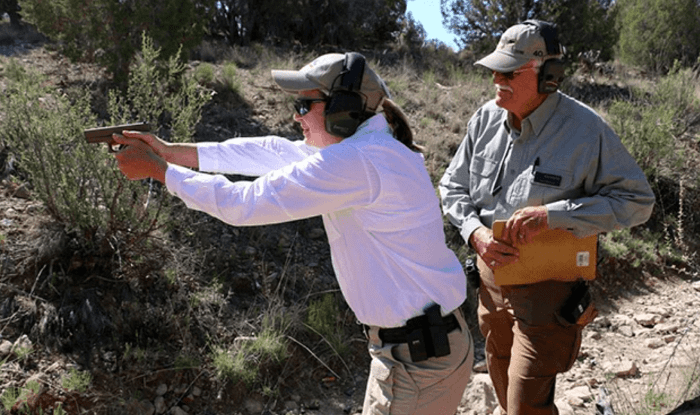
4. A Good Instructor Gives Homework
Quality instruction always includes the sharing of techniques or shooting drills that you can safely emulate during self-guided practice. While some exercises may not be replicable due to your range’s amenities or involvement of multiple participants, every lesson should send you home with at least three skills you can practice on your own.
Here is where astute students use their tuition as an investment. Make notes during breaks of the drills you performed in class, including target sizes and distances, time limits, round counts and so on. Note your best performance and use that as a standard to improve upon.
Jot down insights on gear, gun handling, anything else that strikes you as important. An epiphany in class is too soon forgotten, and time and money wasted if the return to workaday life is allowed to erase the insights gained from a day of focused activity at the range.
5. Great instructors inspire
Skillful instructors stretch students’ comfort zones to test and refine techniques, and great teachers inspire students to become a better version of themselves. While there is no perfect human on this earth, memorable instruction leaves you with at least one principle or way of approaching your firearms handling that sticks with you and to which you can return for guidance in a challenging circumstance.
The Big Picture
It’s possible that an ideal instructor for you today won’t be a perfect match two years from now. If the instructor does their job and you apply what you’ve been taught, you can very well outgrow their skill level.
Consider, as well, that your interests within the gun world may change. Keep an open mind and try different teachers, even those outside your strict area of interest.
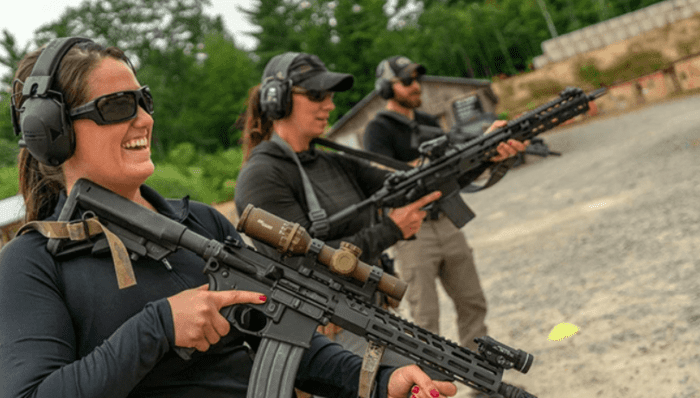
The principles of gun safety, marksmanship and related skills never change. Equipment trends come and go, and sport science drives changes in technique every decade or so. Keep in mind, too, that the best instructors are also students, standing on the traditions and legacies of past masters while testing new ways and staying competent in their realm.
By learning and practicing in earnest, you’re equipping yourself to perhaps be a casual or formal instructor someday as well. Soak it up.
In this video, Gunsite Academy Instructor Bob Whaley discusses training and the importance of repetition and consistency. As Jeff Cooper founder of the Gunsite Academy said, “You must train until it becomes part of your personality.”
This article is reprinted with permission from the National Shooting Sports Foundation.

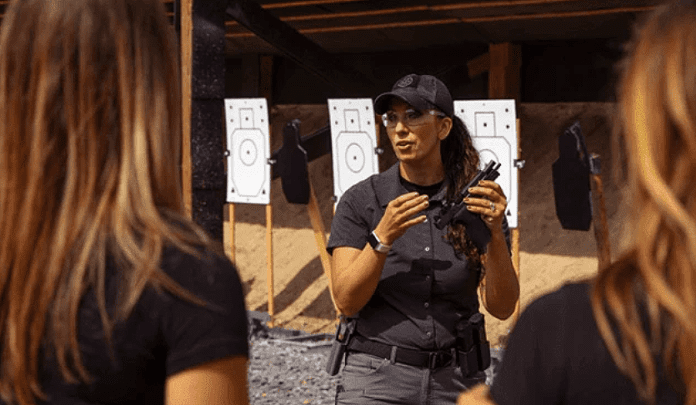



Breaking:Woman SHOT in the head(!)at Shoot Point Blank in Merrilleville,IN. Where I sometimes shoot. Appears to be an “accident” according to the local ABC news. One wonders if she had a “qualified” instructor…???
It isn’t “Breaking”, it happened on December 22nd, 2021, and started being reported in other sources on 26 December.
Upon officers’ arrival, it was determined that a female inside the gun range had sustained a gunshot wound to the head. Two off-duty paramedics, who happened to be in the range, immediately administered first aid until on-duty paramedics arrived. The female was then transported to the hospital to receive further medical assistance. Video footage of the incident was reviewed and it appears accidental with no malicious intent. He condition is not known.
In the mean while on the same date, for accidents in Indiana; 137 people were killed or wounded in car “accidents” … doctors “accidentally” ‘wounded’ 23 patients and killed 3 by malpractice … and 42 people had ‘accidental’ falls from ladders while putting up decorations 7 died.
“accidents” happen, they seem to happen in greater numbers to those not around firearms at the time.
Golly I see it happened on the 26th.
Not the 22nd …meanwhile who gives a dam about car accidents on a gun blog? BTW there are no “accident’s” at gun range’s. Just dumbasses.
Gunms kill ,cars kill more, yet society accepts auto accidents.
happened on 22 Dec
https://regionnewssource.org/woman-shot-at-shoot-point-blank/
“On December 22nd, 2021 at approximately 6:38 PM, Merrillville Police Officers, were dispatched to 8730 Louisiana Street, Merrillville, (Shoot Point Blank), in reference to a gun shot wound, according to Assistant Chief Kosta Nuses.”
https://www.newskudo.com/indiana/merrillville/crime-safety/6661262-woman-shot-at-shoot-point-blank
and of course it counts as “gun violence” to the anti-gun freaks (which really calls into question their numbers because ‘gun accidents’ are not ‘gun violence’ even in their own context of presentation to the public for intentional violence like they want everyone to think) > https://www.gunviolencearchive.org/incident/2197713
“12-22-2021 Indiana Merrillville 1-1
Participants
Type: Victim
Age Group: Adult 18+
Gender: Female
Status: Injured
Type: Subject-Suspect
Status: Unharmed
Incident Characteristics
Shot – Wounded/Injured
Accidental Shooting
Accidental Shooting – Injury
Accidental Shooting at a Business
Accidental/Negligent Discharge
Gun range/gun shop/gun show shooting
Notes
Accidental shooting at gun range; woman shot in head
Guns Involved
1 gun involved.
Type: Unknown
Stolen: Unknown”
happened on 22 Dec > https://regionnewssource.org/woman-shot-at-shoot-point-blank/
“On December 22nd, 2021 at approximately 6:38 PM, Merrillville Police Officers, were dispatched to 8730 Louisiana Street, Merrillville, (Shoot Point Blank), in reference to a gun shot wound, according to Assistant Chief Kosta Nuses.”
And of course it counts as “gun violence” to the anti-gun freaks. > https://www.gunviolencearchive.org/incident/2197713
“12-22-2021 Indiana Merrillville 1-1
Participants
Type: Victim
Age Group: Adult 18+
Gender: Female
Status: Injured
Type: Subject-Suspect
Status: Unharmed
Incident Characteristics
Shot – Wounded/Injured
Accidental Shooting
Accidental Shooting – Injury
Accidental Shooting at a Business
Accidental/Negligent Discharge
Gun range/gun shop/gun show shooting
Notes
Accidental shooting at gun range; woman shot in head
Guns Involved
1 gun involved.
Type: Unknown
Stolen: Unknown”
So in their context of redefining “accident” as “gun-violence”…
The National Highway Traffic Safety Administration shows there were 6,296,000 police-reported “car-violence” crashes in the United States. This translates into approximately 17,250 “car-violence” crashes each day nationwide. Thousands of drivers and passengers are killed each year in America in traffic-related “car-violence”.
You are safer around someone with a gun than you are around someone with a car.
Not a bad idea for even those of us who have been around, owned, carried, handled firearms for many years to take a refresher course on safety and basic handleing skills.
I did a couple years ago and caught myself making a couple minor, but foolish mistakes.
That was exactly why I took the Range Safety Officer class a couple of years ago. I’ve been around guns my entire life, but figured I could use some schooling beyond Gun Safety 101.
It was money well spent, and I did learn a few things I wasn’t aware of.
Step 1: find women instructor from first pic.
Step 2: take class
Step 3: wife.
(snicker)
There are no accidents. There are incidents and/or negligence. It’s predictable. We do a disservice to all when we explain it away as an “accident”.
Good to see more ladies empowering themselves. That first photo answers one question I’d wondered about…yellow Kydex holsters are F’ugly. I guess the holsters and firearms are instructor supplied?
No surprise that the GV Archives include accidents / negligence in their bogus reporting…Bloomberg sets the reporting requirements and signs their paychecks. It’s a shame that little floater in the punch bowl of life continues to push his Agenda whilst surrounded by the finest mercs his $$ can buy.
By sheer good luck I found a great instructor after I had gotten very rusty from not practicing during this Covid BS and high ammo prices. In one hour he corrected my sloppy grip, slapping the trigger, and taught me that shooting with both eyes open was the way to go. Great attitude, very attentive to detail and safety. Real world experience as USMC and local SWAT officer with training as a side business. Added bonus – he has a range on his property.
This is an excellent article and a good resource to bookmark and review for when picking an instructor. Thank you for posting it.
quick overview of the medicine! Xanax ksalol 1mg is used in the short-term treatment of panic disorders, generalized anxiety, and depression. Its generic name is Alprazolam
I check your blog every day and try to learn something from your blog. Thank you and waiting for your new post.
Thanks for the tip that it’s going to be more than just checking a resume when finding the right instructor for firearms training. I’d like to buy my own gun soon so I want to make sure that I know exactly how to handle it. Taking classes for that will be ideal.
Comments are closed.